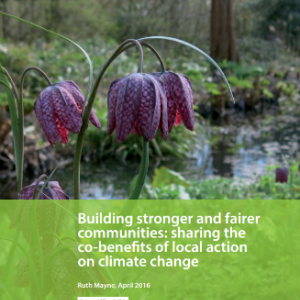
This report by Agile-ox, a project based at the Environmental Change Institute at the University of Oxford, 'Sharing the co-benefits of local action on climate change' aims to promote discussion and provide practical ideas, case studies and a checklist about how local action can help contribute to a fair and fast transition to a low carbon economy in a way that benefits residents, reduces social divides and builds broad public support for action.
The term co-benefit refers to any additional social, economic, health and environmental benefits arising from carbon reduction programmes other than carbon savings.
In particular, the report’s purpose is to:
- Support local organisations’ efforts to widen and deepen carbon reduction by highlighting recent evidence about the social, health, environmental and economic co-benefits of carbon reduction policies and programmes.
- Provide practical proposals, a checklist and motivating case studies about how to enhance the design of local carbon reduction interventions so that they generate and share co-benefits and hence contribute to stronger and fairer communities.
It presents some of the latest evidence on co-benefits (and costs) relating to low carbon transport, home energy, food, renewable energy and community programmes and argues that the growing evidence base:
- Strengthens the case for ambitious local action on climate change, irrespective of what other regions or countries do;
- Highlights how local carbon reduction programmes can simultaneously help tackle climate change and contribute to other important local strategic objectives to improve wellbeing and protect the environment – including a strengthened local economy, local jobs, improved air quality, reduced congestion, reduced fuel poverty, healthier diets, more active and engaged communities, amelioration of local flooding and an improved natural environment;
- Reinforces the importance of designing local carbon reduction programmes in an inclusive and fair manner that helps reduce the county’s social divides, strengthens the sense of common purpose and builds public support for action on climate change;
- Provides a way of achieving more with less by helping widen engagement, identify links between different work streams and organisations, encourage joint working and cut costs, all particularly relevant in the current constrained financial context;
- Can help strengthen the case for a strong and equitable central government policy framework and financial incentive structure to support local carbon reduction programmes.
The report was written for Oxfordshire but its lessons and recommendations could potentially be applied to other regions.
The food section starts on page 52 of the report.
The report summary and full report can be found here.
You can find related resources in our research library categories on climate policy, mitigation policies, green economy, low carbon development.







Post a new comment »